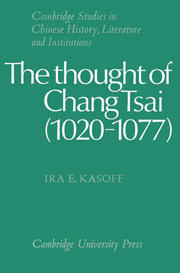1 - The intellectual climate of the eleventh century
Published online by Cambridge University Press: 02 February 2010
Summary
Introduction
By the time of the Sung dynasty, the ‘great families’ which had dominated Chinese society from the Han dynasty (206 b.c.–a.d. 220) into the late T'ang gradually lost their preeminent position, and by the eleventh century a new elite had emerged. The members of this elite group gained their social and political power not primarily because they represented powerful families, but through a mastery of the traditions of classical culture, a mastery evidenced by success or failure in the examination system. The remarkable blossoming of culture in such areas as philosophy, prose writing and historical studies that occurred in the eleventh century was related to this social change.
The appearance of the philosophical schools of Chang Tsai and of the Ch'eng brothers was one of the most significant developments of this period. In this chapter I will attempt to provide a context in which to view those two schools.
The philosophical developments of the eleventh century can be seen in part as an attempt by the literati to define the Way – the moral and political principles of the state – and to implement that definition. This entailed defining the texts that were to be considered most important, and even more significant, determining what lessons to draw from those texts. By teaching these lessons, the Way as they defined it could then be used to instruct and indoctrinate future generations of literati, who would eventually make up the new political and intellectual elite. Much of the philosophical debate during this period centered on how to to determine a definition of the Way.
- Type
- Chapter
- Information
- The Thought of Chang Tsai (1020–1077) , pp. 7 - 33Publisher: Cambridge University PressPrint publication year: 1984

